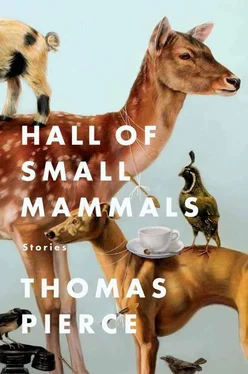The manager, as far as Bert could tell, was doing very little to help locate the casket, instead only nodding his approval at various mouse click maneuvers. This was no way to run a business! Companies were only as strong as the people it hired, top to bottom. Bert was diligent when it came to hiring for his own business. He’d retired from real estate ten years ago to open his first Pop-Yop, the soft-serve franchise. If all went well he’d be cutting the ribbon on his fourth by the end of the year. None of it would have been possible if he had employees like these two.
The phone rang, and the woman snatched it up, cradling it between her shoulder and ear. Someone was talking very fast and high on the other end of the line, a garbled mess of sound that Bert did his best to decipher from his side of the counter.
“This might be a while,” she whispered to Bert after a minute, hand over the receiver. “You can go sit down. We’ll come and find you when we have something.”
But Bert didn’t want to sit down. He refused to sit down. Sitting down was giving up. No matter how much his legs ached, he would stand here, checking his wristwatch, breathing deep. He would hold them accountable.
His wife’s phone rang — a chorus of chirping frogs in his pocket — and Bert was relieved to see Mrs. Oliver’s overseas number blink onto the screen.
“You were right,” she said when he answered. “Rob wasn’t on the plane after all. I’m afraid I have some unfortunate news. They’re telling me now that they can’t release the body. Not yet anyway.”
“Can’t release him?” Bert asked.
(Behind the counter the airline employees glanced at each other, clearly relieved to learn they weren’t at fault and this was no longer their problem to solve.)
Mrs. Oliver was talking in a rush, her voice low but airy, as if they were connected not by a phone but by a paper-towel tube that spanned the ocean. Each phrase landed in his ear with a thump: security issues, protocol, red tape. She said they wanted to be certain before they risked bringing his brother back into the country.
“Hold on,” he said. “Certain of what?”
“Of what it was that killed him.”
“I don’t understand. I thought we already knew that. I thought the autopsy confirmed the aneurysm.”
“It did. Or it almost did, I guess. The bottom line is, they want to do a second one.”
“Is that typical?”
“I don’t think so, no,” Mrs. Oliver said. “None of this is typical. It’s a very unusual situation. I’m afraid I don’t have much more information for you. They’re being a bit cagey about all of it. But you have my word: I’ll stay on it. If I have to take this higher up the chain, I will. I’ll be in touch, Bert. More soon.”
• • •
Bert and his wife were eating dinner at an Italian restaurant near the movie theater that night. It was a muggy May evening, but beside their outdoor table a heatless electric fire flickered in a bowl-shaped pit painted a sooty black.
“God, do they think he was murdered?” his wife asked.
“No one’s said anything about murder,” he said. It was a silly idea, he knew, but, strangely, also a somewhat pleasing one to consider. He didn’t wish his brother to have been murdered. Not at all. But it was a new angle for them to discuss. “He wasn’t even forty yet, it’s true. He was healthier than me. I’m the one who had the bypass. If anyone was just going to drop dead in a hotel pool, it’s me, don’t you think?”
Ever since getting the news about Rob, he’d been doing his best to avoid that particular image, his brother’s chlorinated corpse, the swirl of his brown hair on the surface of the water, his swim trunks bubbled out, floating, floating, floating.
They’d almost polished off an entire bottle of wine, and the food hadn’t arrived. Bert was hungry, so hungry that he yelled over to the waitress when she delivered plates to a nearby table whose occupants — Bert couldn’t help but keep an eye on such things — had sat down ten or possibly even fifteen minutes later than them.
“Have you forgotten about us?” he called over to her.
“Of course not, sir. I’ll check with the kitchen again.”
The waitress scurried away, and Delia, Bert’s wife, pretended to need something out of her purse, embarrassed that he’d raised his voice in public. She didn’t like it when he was ornery with people, particularly with waitstaff. As a teenager, she’d worked summers at a fish camp, serving up fried catfish and hush puppies on newspaper in plastic baskets, and despite the fact that she hadn’t worked a single day since marrying Bert, she still professed an allegiance to anyone working in the service industry.
“I’m sorry,” he told her quietly. “It’s just that this has been such a strange week. What did the girls have to say?”
The girls — his daughters — were not really girls anymore. The oldest was working for a tech start-up on the West Coast. The youngest was a senior in college. Delia had talked to them both that afternoon on the phone while he was at the airport.
“Well,” she said. “They hardly knew him.”
Her phone chirped. She glanced at the screen and held it out for Bert. It was Mrs. Oliver again. “What’s the latest?” he asked, rising from his chair. His black napkin slid from his lap and landed in a heap on the concrete. He darted through the tables to a far corner of the patio where he might be able to hear her better.
“They’re telling me now it was some sort of infection. That’s what caused the aneurysm.”
“What sort of infection? Did they say?”
“That’s what they’re trying to figure out. That’s the next step, apparently.”
“Is this something he could have picked up at one of his sites?” he asked. His brother was an exploratory geologist and had worked for a company with mines all over the world. He’d traveled constantly.
“They haven’t ruled anything out yet,” Mrs. Oliver said. “They put him on a plane this morning. He landed in Singapore a few hours ago, and now he’s on his way to Sydney.”
She reported all this as if Rob had boarded the plane himself, as if he’d upgraded his seat and was currently knocking back a few complimentary cocktails in business class. None of this made any sense: instead of bringing Rob home, they were sending him farther away?
“Keep in mind,” Mrs. Oliver said, “his company is Australian. This is all being done through the proper channels. There’s an infectious disease center there that’s offered to look into his case. They might be able to figure this out. Okay, more as I have it.” The line went dead before Bert could ask any more questions. At that very moment, his brother, poor Rob, was somewhere over the Pacific Ocean in the belly of a plane, very likely sealed up in hazmat bags and labeled with all sorts of biohazard warnings and destination stickers.
When Bert sat back down at the table, his food was waiting for him, a giant plate of chicken puttanesca. Delia had already started nibbling at hers. She ate like a mouse. It was no wonder she’d never struggled with her weight like he had. He discovered that he’d lost his appetite but he still somehow managed to finish most of his meal.
• • •
It was a virus. Or at least something very virus- like . That is, the culprit behaved similar to and had the characteristics of a virus but was possibly not an actual one. Bert had trouble keeping it all straight as information trickled in over the next few weeks from the lab, via Mrs. Oliver, but Bert’s personal theory, one that he offered his wife one night in bed, was that his brother had been exposed to some sort of subterranean flu, a dangerous little bug that had been hibernating in the rocks or the ice for millions of years and that had been released by the mining drills. The earth was on the verge of a pandemic against which it had no immunity, and his brother was Patient Zero.
Читать дальше












